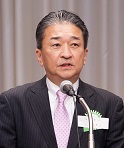Living through the Attacks of September 11th
August 30, 2017
Mr. Hideyuki Takahashi
Director & Chairman,
State Street Trust and Banking Co., Ltd.
�� Let me briefly introduce State Street Trust and Banking Co., Ltd. which I have been working for the past three years, after my 35-year-service at Nomura Securities Co., Ltd. State Street is a financial services company established in 1792 to serve the then thriving maritime trade in Boston. We have evolved into a bank for institutional investors and provide comprehensive financial products and services, with 3,300 trillion yen of assets under management throughout the world. The Tokyo branch opened 30 years ago and today, we have in total 400 staff members from 14 countries working at our offices in Tokyo and Fukuoka.
Let me briefly introduce State Street Trust and Banking Co., Ltd. which I have been working for the past three years, after my 35-year-service at Nomura Securities Co., Ltd. State Street is a financial services company established in 1792 to serve the then thriving maritime trade in Boston. We have evolved into a bank for institutional investors and provide comprehensive financial products and services, with 3,300 trillion yen of assets under management throughout the world. The Tokyo branch opened 30 years ago and today, we have in total 400 staff members from 14 countries working at our offices in Tokyo and Fukuoka.
��I went through the terrorist attacks of 9/11 during my assignment to Nomura Securities New York branch from 2000 to 2007. Our office rooms back then were on the 17th to the 22nd floors of the World Financial Center Building located directly across the World Trade Center (WT) where the hijacked airplanes smashed into. Around 8:30am that morning, I felt the ground sway like an earthquake. There was a public announcement immediately after, informing us about the fire that had broken out at WT and telling us to stay calm and remain in our offices. From the window, I could see flames surrounding the top of the 100-floor building and glass fragments and documents flying around like snowflakes against the blue sky.
��I thought the fire would be extinguished soon but just then, there was a thunderous roar and another airplane smashed into the adjoining building, making a massive blaze. Now we had a different announcement warning that another plane was headed toward us and we had to evacuate immediately. I took the emergency stairs from the 22nd floor filled with people. Fortunately, it led to the other side of the building that escaped fire and damage.
��Mobile phones became inoperable so I headed toward another small office we had rented at that time in New Jersey, hoping the telephone would work there. I took the last ferry across the Hudson River. Looking back, the entire WT area was covered with dust and smoke caused by the collapsing towers. We reached New Jersey but the area had already been sealed off except for emergency vehicles. I hitchhiked for the first time in my life and managed to reach a hotel near the office. There, I could receive phone calls and was relieved to know many of my colleagues were safe and sound.
��We got a special permission to enter our offices three days after the terrorist attacks. All the windows that faced the WT were shattered by the blast and debris covered our office rooms. The FBI had sealed off the entire building to preserve the evidence so we had to wait for more than six months to resume operation there.
Now we had to restore our business back to normal and assign 1,200 staff members to temporary offices. 250 of us worked at the Crisis Management Office in the outskirts of New Jersey. We had previously established this office to tackle the Y2K problem. The other staff members were assigned to 10 temporary offices we managed to set up in haste. But our ordeal didn��t end here. In a short time, the anthrax attacks spread through the U.S. postal service, inflaming public fear. People felt cornered, suffering from endless doubt and suspicion. Before returning to our former offices, we conducted thorough refurbishment and cleaning to reduce anxiety and prevent any health hazards.
��Going through such a dramatic experience, I have learnt some important lessons. Firstly, it is essential to compile a manual to prepare for basic risks but each one of us must be responsible to judge where and how to evacuate when faced with unexpected risks. Secondly, we should delegate complete authority to offices at the disaster sites to facilitate emergency response and recovery efforts. The standard procedure of getting permissions from the Head Office will impede immediate actions. It is equally important to keep the Head Office updated with the recovery status and the overall situation. Disclosure of timely, accurate and relevant information plays an instrumental role in avoiding groundless rumors and confusion. Thirdly, we should try to provide psychological care by professional counselors to our staff members and make them share their grief and anxiety, rather than placing them on standby at home. And fourthly, we must formulate a comprehensive logistics plan to prepare for emergency situations. It ranges from establishing a backup site to function as an emergency operations center to meeting the basic needs of food, water and sanitary facilities of our staff members. We must ensure minimum comfort of any temporary working environment to boost our employees�� morale in challenging times. These are the life-changing lessons that I gained by living through the 9/11 terrorist attacks.